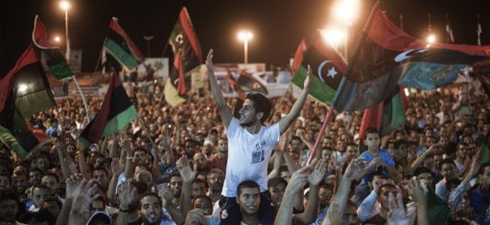For the Libyan dictator and his regime, the moment of truth has finally come. After months of a ‘forgotten war’ in the backyard of Europe, the fall of Gaddafi will allow NATO to save face. In theory, that is. In fact, it will not be easy to manage. If Libya is left to its own devices by a Europe struggling with financial crisis, the victory could well end in failure: or, in the cynical and pessimistic phrase circulating in Brussels, "a catastrophic success".
The precedents – from the Balkans to Afghanistan – reveal the costs and risks that follow wars. In the Libyan case, the first risk is that the fall of Gaddafi opens up a new cycle of violence, leaving civilians exposed, and that the broad front of "winners" crumbles in the settling of scores past and present. How can security be assured? It is already clear that the United States, after taking part reluctantly in military operations, wants to back out. Barack Obama has no intention of providing manpower or economic aid to manage a problem he considers to lie in the European sphere of responsibility.
In turn, Europe, which has led the military intervention from Paris and London – exposing the limits of its capabilities – will step down, and intends to back the idea being discussed at the UN that an initial technical assistance mission be given to Arab and South African contingents. After Gaddafi, therefore, the role of countries such as Turkey and the Gulf monarchies will increase. Formally, the responsibilities for security will lie with the Libyans themselves. With uncertain results, of course. Including for European interests.
The risk is even more evident on the political front. Italy, Europe and the United States have wagered on a specific hypothesis: that the National Transitional Council (NTC) set up in Benghazi will manage to secure a reconciliation process by controlling the tribal rivalries and starting to create national institutions in a country where they have never existed. It's a risky bet, complicated further by the role in the military offensive against Tripoli of the rebels in the west, the Berbers of the Nafusa Mountains [southwest of the capital]. How many among those who fought against Gaddafi are willing to recognise the leadership in Benghazi? Europe will no longer have the same influence once the rebels have taken over. Today – even yesterday – is the time to discuss the conditions that will follow Gaddafi, before we suffer a "catastrophic success".
Economic agreements can serve as leverage. It is more than likely – and legitimate – that the European countries will try to secure their energy interests. On the other hand, it would be absurd if Europe, divided on supporting the rebels, is divided further on how to handle what comes after the war, or by squabbles over the unfreezing of Libyan assets in Europe, which should be used for securing guarantees on the future of Libya.
In recent months Europe has fought two wars: an internal war by other means over the fate of the euro, and a conventional foreign war over the destiny of a key country on the Mediterranean front. Internal tensions over the handling of the economy have certainly not helped Europe’s performance in foreign policy. The position of the central country, Germany, is highly indicative: its economic position, that is, both domestically and along its borders, as shown by Berlin’s aloofness from the war in Libya.
The reality, however, is that Europe will win or lose two wars at the same time. If the euro area were to be split along a north-south divide, the economic and monetary fracture of the union would become a factor in the geopolitical instability of the Mediterranean. It would be a catastrophic scenario for a country like Italy, but certainly would not be halted at the borders of the Rhine. For those who grasp the political interests of the Old World, stopping the collapse of stock markets and managing the fall of the Gaddafi regime are widely divergent tasks only on the surface. The security of Europe depends as much on the one as the other. And it depends on us, too: with the end of the war in Libya, the period of American tutelage has come to an end.
Was this article useful? If so we are delighted!
It is freely available because we believe that the right to free and independent information is essential for democracy. But this right is not guaranteed forever, and independence comes at a cost. We need your support in order to continue publishing independent, multilingual news for all Europeans.
Discover our subscription offers and their exclusive benefits and become a member of our community now!












